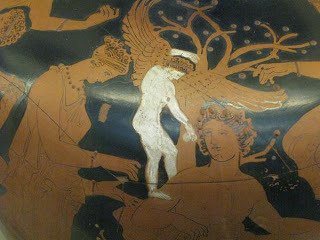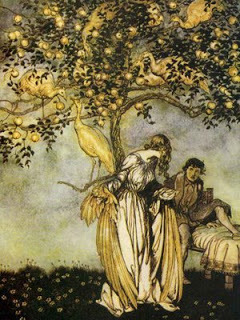The Silver Apples of the Moon, the Golden Apples of the Sun
 Here is Hercules, on an Athenian vase, plucking the golden apples of immortality in the Garden of the Hesperides. The giant female figures are the Hesperides themselves - the Daughters of Evening or Western Maidens, designations all apparently tied to their imagined location in the distant west. (Hesperis is the personification of the evening: Hesperus is Venus as evening star.)
Here is Hercules, on an Athenian vase, plucking the golden apples of immortality in the Garden of the Hesperides. The giant female figures are the Hesperides themselves - the Daughters of Evening or Western Maidens, designations all apparently tied to their imagined location in the distant west. (Hesperis is the personification of the evening: Hesperus is Venus as evening star.) But what is it about apples? Why are they so evocative? Why was the fruit of the Tree of the Knowledge of Good and Evil – not named in the Bible – assumed to be an apple? Not only did golden apples of immortality grow in the Garden of the Hesperides, but the goddess Idun was the keeper of golden apples which preserved the youth of the Norse gods. Why was the Apple of Discord – with its inscription To the Fairest - an apple at all, and why were three golden apples so irresistible to Atalanta that she paused to pick them up and lost her race?
The apple as the fruit of immortality, or perhaps equally of death, appears as a symbol in Celtic mythology too. Heralds from the Land of Youth would bear a silver apple branch, with silver blossom and golden fruit, whose tinkling music lulled the hearers to sleep – perhaps to everlasting sleep… And Arthur, after his final battle, went to the island of Avalon, the island of apples, to be healed of his mortal wound. And of course there's the apple Snow-White's stepmother gave her, of which one poisoned bite sent her into a death-like sleep.

Stay me with flagons, comfort me with apples, for I am sick of love... Apples are tokens of love and promises of eternity. In Yeat's 'The Song of Wandering Aengus', the lovelorn Aengus seeks forever for the beautiful girl from the hazel wood.
Though I am old with wandering
Through hollow lands and hilly lands
I find out where she has gone,
And kiss her lips and take her hands;
And walk among long dappled grass
And pluck till time and times are done,
The silver apples of the moon,
The golden apples of the sun.
But such an eternity is probably also the land beyond death.
Where do apples even come from, why are they so ubiquitous? Why are there, even today, so many varieties available even in supermarkets, usually the home of homogeneity? I went into our local Sainsburies the other day and counted eleven different named varieties of apple all on sale at once: Empire, Royal Gala, Red Delicious, Golden Delicious, Cox's Orange Pippin, Russets, Granny Smiths, Pink Ladies, Jazz, Braeburns and Bramleys. (In comparison, there were four named varieties of pears, and everything else was generic – bananas, strawberries, oranges, etc.)
But if you look here, you'll find names and pictures of many more, older varieties with names like poems. Adam's Pearmain. Foxwhelps. D'Arcy Spice. Marriage-Maker. St Ailred. Sops-in-Wine. And Ribston's Pippin, of which Hilaire Belloc wrote:
I said to Heart: "How goes it?"
Heart replied,
"Right as a Ribston Pippin!"
But it lied.
Apples are related to roses, I'm delighted to tell you. According to a rather lovely book called 'Apples: the story of the fruit of temptation', by Frank Browning (Penguin 1998):
'In the beginning there were roses. Small flowers of five white petals opened on low, thorny stems, scattered across the earth in the pastures of the dinosaurs, about eighty million years ago. …These bitter-fruited bushes, among the first flowering plants on earth, emerged as the vast Rosaceae family and from them came most of the fruits human beings eat today: apples, pears, plums, quinces, even peaches, cherries, strawberries, raspberries and blackberries.
'The apple [paleobotanists believe]… was the unlikely child of an extra-conjugal affair between a primitive plum from the rose family and a wayward flower with while and yellow blossoms of the Spirea family, called meadowsweet.'
Isn't that wonderful? Apples as we know them today developed in Europe and Asia. The Pharoahs grew them. The Greeks and Romans grew them. And they keep. You can store apples overwinter, eat them months after you've picked them: fresh fruit in hard cold weather when there's nothing growing outside. So perhaps you would think of them as life-giving, immortal fruit. They smell fragrant. They feel good too: hard-fleshed, smooth, a cool weight in the hand.

The medieval lyric Adam lay y-bounden provocatively celebrates the Fall of Man when Adam ate the forbidden fruit:
And all was for an appil
An appil that he toke
As clerkes finden
Written in her boke.
…by ending with the mischievously happy thought that, if Adam had not eaten the apple, Our Lady would never have become the Heavenly Queen:
Blessed be the time
That appil take was!
Therefore we maun singen:
Deo gratias.
Here is a poem by John Drinkwater (surely the most poetically-named poet ever) which consciously or unconsciously captures some of those mystical coincidences of apples, eternity, sleep, moonlight, magic and death.
MOONLIT APPLES
At the top of the house the apples are laid in rows,
And the skylight lets the moonlight in, and those
Apples are deep-sea apples of green. There goes
A cloud on the moon in the autumn night.
A mouse in the wainscot scratches, and scratches, and then
There is no sound at the top of the house of men
Or mice; and the cloud is blown, and the moon again
Dapples the apples with deep-sea light.
They are lying in rows there, under the gloomy beams
On the sagging floor; they gather the silver streams
Out of the moon, those moonlit apples of dreams
And quiet is the steep stair under.
In the corridors under there is nothing but sleep.
And stiller than ever on orchard boughs they keep
Tryst with the moon, and deep is the silence, deep
On moon-washed apples of wonder.
Published on May 13, 2011 11:11
No comments have been added yet.



